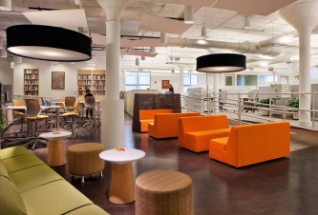When Interaction Associates, a 42-year provider of collaborative leadership practices, relocated to 11,460 square feet in a former warehouse building in Boston’s Seaport Center, the new space needed to reflect the firm’s unique work style and focus on collaboration.
Demetra Anagnostopoulos, chief marketing officer at Interaction Associates, says that the design question for the firm was, “How can we create a work environment that supports the way we work together and reflects our brand?”
The resulting alternative workplace design draws people into group settings, effortlessly creating collaboration. That’s just one of the stories Dianne A. Dunnell, a senior associate and project interior designer at Marguilies Perruzi Architects in Boston has to share in her experience with alternative workplace design.
Alternative workplace design encompasses work practices, settings and locations. The alternative workplace model is also known as high performance workspace, workplace transformation or workplace innovation, as it substantially deviates from traditional office designs and practices.
How Design Impacts Innovation
Anagnostopoulos says, “The design of our workplace has impacted innovation for us”. Perruzi explains that the new office features private cubicles with shared meeting tables, “continuous desks” that offer flexibility for employees who are frequently in and out of the office, collaborative work areas that feature multiple seating configurations, and the prominent placement of technology, such as a series of multimedia-enabled conference rooms, private telephone rooms set up for Skype video calls, and a media:scape table to promote collaboration.
With alternative workplace design, there is also a reduction in support spaces such as mailrooms and copy rooms. Perruzi talked to us about Philips’ alternative workplace design in a previous article, but points to the company’s scheme again in the context of Interaction Associates.
“At Philips, the design eliminated both rooms altogether since everything is electronic,” she says. “Instead, a file cabinet credenza outside the café serves as the mail station, and each neighborhood offers a tabletop printer-copier. Employees are allocated one drawer in group storage in each neighborhood, encouraging electronic filing in lieu of paper.”
For free addressing arrangements like Philips’, she says, a clean desk policy and no personal file cabinets necessitate storage lockers for coats, personal items, and work supplies. Some companies offer small file cabinets on wheels that employees push to their chosen desk each day, she says, and the “wheelie” is the only designated space for personal storage.
A New Work Concept
“The openness and flexibility of alternative workplace design can be implemented in any raw space. However, alternative workplace design is more than a new workspace; it’s also a new work concept – one that inspires employees and clients to work together in a truly collaborative fashion,” Perruzi says.
As she sees it, company culture and management should be in sync on what the design of an alternative workplace means for any given firm. For example, the level of employee satisfaction in a free addressing program is usually very high, but implementing it doesn’t work for all departments.
That’s just as true for business centers. You can’t just hop on a hot alternative workplace design trend because it’s hot. If you plan to incorporate alternative workplace design principles into your business center, make sure it fits with your culture and that your management is in sync. How would alternative workplace design disrupt your current tenants, if at all? Does the rise in mobile workers using your facility demand a quick change? Or is it likely that your target audience would buck against such changes?
At the same time, don’t let timidity tamper with the possibilities to drive innovation for the companies doing business at your serviced office space. Long-term, alternative workplace design is poised to take over. By keeping a pulse on office space trends now, you can incorporate ideas that best suit your target market little by little. The key word is innovation.
“The innovation coming out of a collaborative work environment may also be quantifiably measured, boosting the argument for an open-plan design,” she says. “Don’t be motivated, however, to embrace an alternative workplace just for the real estate cost savings. The concept, applied to its fullest, can help a company attract the best talent wherever they may be.”
While there is no one way to implement an alternative workplace, the tenets of openness, flexibility, collaboration and communication remain, Peruzzi says. Her suggestion: make the space inspirational to encourage creativity, dynamism, and dialogue. In this era of mobility, prompt communication and information exchange, she says, the alternative workplace concept is fast becoming the norm in interior office design.
Image: www.mp-architects.com



 Dr. Gleb Tsipursky – The Office Whisperer
Dr. Gleb Tsipursky – The Office Whisperer Nirit Cohen – WorkFutures
Nirit Cohen – WorkFutures Angela Howard – Culture Expert
Angela Howard – Culture Expert Drew Jones – Design & Innovation
Drew Jones – Design & Innovation Jonathan Price – CRE & Flex Expert
Jonathan Price – CRE & Flex Expert











